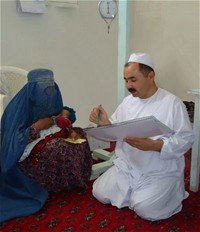
A community health worker treats a child with pneumonia, explaining the treatment to her mother.
USAID/BASICS
USAID works with the Afghan Ministry of Public Health to improve the quality of healthcare provided by community health workers
10 SEPTEMBER 2011 | BAMYAN, AFGHANISTAN
Bamyan’s mountain ranges are beautiful to the eye. Rugged peaks and ridges are separated by valleys, carved out over the centuries by streams and rivers supporting the green web of vegetation along their banks.
But many of the small villages that cling to the walls of these valleys are often cut off for months by heavy snow or the floods that follow the spring melt. The cold wet climate, together with smoke from household stoves, increases the risk of pneumonia, particularly among infants and children. One in five deaths of young Afghan children is caused by pneumonia, an infection easily treated with antibiotics if diagnosed early enough.
USAID works with the Ministry of Public Health and non-governmental organizations to assist community health workers in recognizing and treating pneumonia in the early stages, before it becomes life-threatening.
Through training in community-based integrated treatment of childhood illnesses, community health workers, like Abdullah from Bamyan Province, are able to assess whether a child with an acute respiratory infection needs antibiotics, or if the illness is severe enough to refer to the nearest health center.
"I knew about pneumonia before, but this training has made me more confident in recognizing the danger signs," said Abdullah. "Because we were able to treat children early, there were fewer cases of pneumonia in my community this past winter."
Abdullah is one of more than 22,000 community health workers who form the cornerstone of the Afghan health system. They treat almost half of all cases of child pneumonia because they work at community level, often in small remote villages, a long way from a health clinic.
USAID works with the Afghan Ministry of Public Health to improve child healthcare at the community, health facility, and hospital levels by introducing growth monitoring and promotion, Integrated Management of Childhood Illnesses, newborn care, Pediatric Hospital Improvement, and integrated child survival package.







Comment
Make a general inquiry or suggest an improvement.